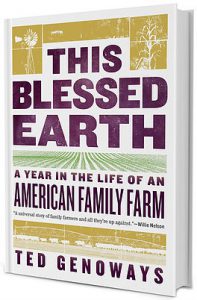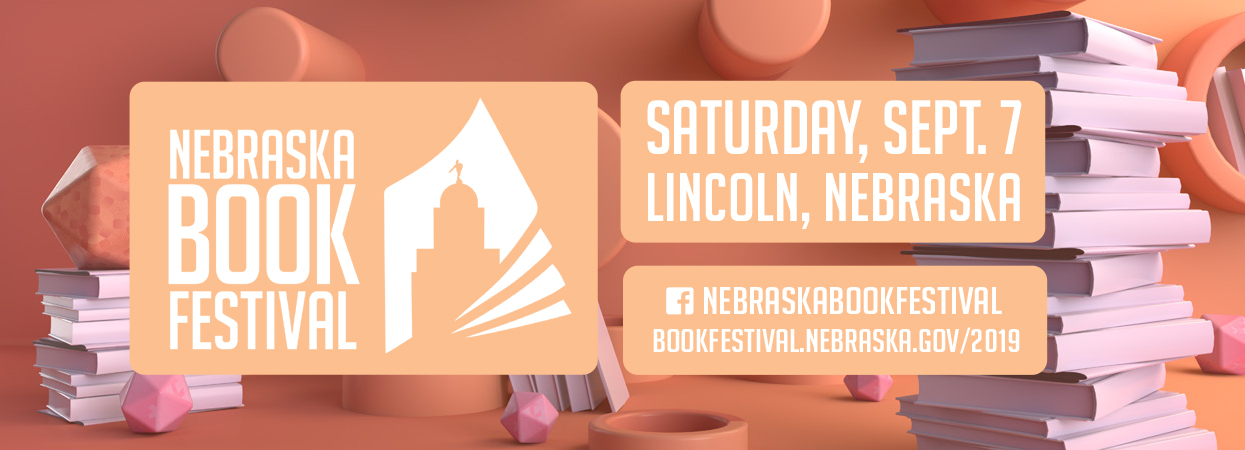
Ted Genoways spent a year following a Nebraska farm family – the Hammonds – and writes about his experiences and observations in his book,
This Blessed Earth. Rick Hammond and his family raise soybeans, corn, and cattle on their fifth-generation farm near York. Genoways has said that the book intends a “kind of farm-level understanding of the systems that currently exist.” Genoways captures the challenges of farming and life experienced by this one farm family and, more generally, others.
Genoways, a Nebraskan with long-standing family ties to farming, underscores the fact that farming is a huge gamble. In part, it is a matter of living with the uncertainty of weather, the unpredictability of global markets, federal farm policies, finances and more. These and many other challenges determine whether farming income exceeds expenses, falls below, or breaks even. A sudden storm, a downward turn in the markets, equipment breakdowns, and other unexpected events can change prospects dramatically.
Today’s farms are remarkably different from those of previous generations – farms covering thousands of acres, large and expensive tractors, and other equipment with computer screens, and GIS technology to determine spacing and measurement of soil moisture.
A bonus is the historical content and commentary that Genoways provides. Genoways writes about plant science, hybrid seeds, chemicals, water rights, irrigation, and much more. I grew up on a northeast Nebraska farm, decades ago. We raised soybeans among other crops. I had no idea that Henry Ford’s leadership, research, and initiatives were critical in the soybean becoming the dominant agricultural commodity that it is. Genoways details Ford’s recognition of the potential of the soybean for manufacturing and other byproducts. Genoways writes in-depth about Nebraska’s water resources, needs, vulnerability, policies, and management.
Beyond their hard work and self-reliance, farmers must have multiple skills – the ability to fix what is broken, the knowledge to grow and manage crops, the judgment to know when to plant and harvest, to raise and care for livestock, and the intellect to know when to buy and sell.
This Blessed Earth has received much-deserved recognition. It is the book selected by both Iowa and Nebraska for the two states’ 2019 statewide reading programs – All Iowa Reads and One Book One Nebraska. It is among the Smithsonian’s “Ten Best History Books of 2017” and it is the prizewinner of the Stubbendieck Great Plains Distinguished Book Award presented by the Center for Great Plains Studies.
Ted Genoways is a Nebraska book Award winner for both poetry (
Bullroarer: A Sequence) and nonfiction (
The Chain).
Genoways will speak at the
Nebraska Book Festival on September 7.

Genoways, Ted.
This Blessed Earth. W.W. Norton, 2017.
 Ted Genoways spent a year following a Nebraska farm family – the Hammonds – and writes about his experiences and observations in his book, This Blessed Earth. Rick Hammond and his family raise soybeans, corn, and cattle on their fifth-generation farm near York. Genoways has said that the book intends a “kind of farm-level understanding of the systems that currently exist.” Genoways captures the challenges of farming and life experienced by this one farm family and, more generally, others.
Genoways, a Nebraskan with long-standing family ties to farming, underscores the fact that farming is a huge gamble. In part, it is a matter of living with the uncertainty of weather, the unpredictability of global markets, federal farm policies, finances and more. These and many other challenges determine whether farming income exceeds expenses, falls below, or breaks even. A sudden storm, a downward turn in the markets, equipment breakdowns, and other unexpected events can change prospects dramatically.
Today’s farms are remarkably different from those of previous generations – farms covering thousands of acres, large and expensive tractors, and other equipment with computer screens, and GIS technology to determine spacing and measurement of soil moisture.
A bonus is the historical content and commentary that Genoways provides. Genoways writes about plant science, hybrid seeds, chemicals, water rights, irrigation, and much more. I grew up on a northeast Nebraska farm, decades ago. We raised soybeans among other crops. I had no idea that Henry Ford’s leadership, research, and initiatives were critical in the soybean becoming the dominant agricultural commodity that it is. Genoways details Ford’s recognition of the potential of the soybean for manufacturing and other byproducts. Genoways writes in-depth about Nebraska’s water resources, needs, vulnerability, policies, and management.
Beyond their hard work and self-reliance, farmers must have multiple skills – the ability to fix what is broken, the knowledge to grow and manage crops, the judgment to know when to plant and harvest, to raise and care for livestock, and the intellect to know when to buy and sell.
This Blessed Earth has received much-deserved recognition. It is the book selected by both Iowa and Nebraska for the two states’ 2019 statewide reading programs – All Iowa Reads and One Book One Nebraska. It is among the Smithsonian’s “Ten Best History Books of 2017” and it is the prizewinner of the Stubbendieck Great Plains Distinguished Book Award presented by the Center for Great Plains Studies.
Ted Genoways is a Nebraska book Award winner for both poetry (Bullroarer: A Sequence) and nonfiction (The Chain).
Genoways will speak at the Nebraska Book Festival on September 7.
Ted Genoways spent a year following a Nebraska farm family – the Hammonds – and writes about his experiences and observations in his book, This Blessed Earth. Rick Hammond and his family raise soybeans, corn, and cattle on their fifth-generation farm near York. Genoways has said that the book intends a “kind of farm-level understanding of the systems that currently exist.” Genoways captures the challenges of farming and life experienced by this one farm family and, more generally, others.
Genoways, a Nebraskan with long-standing family ties to farming, underscores the fact that farming is a huge gamble. In part, it is a matter of living with the uncertainty of weather, the unpredictability of global markets, federal farm policies, finances and more. These and many other challenges determine whether farming income exceeds expenses, falls below, or breaks even. A sudden storm, a downward turn in the markets, equipment breakdowns, and other unexpected events can change prospects dramatically.
Today’s farms are remarkably different from those of previous generations – farms covering thousands of acres, large and expensive tractors, and other equipment with computer screens, and GIS technology to determine spacing and measurement of soil moisture.
A bonus is the historical content and commentary that Genoways provides. Genoways writes about plant science, hybrid seeds, chemicals, water rights, irrigation, and much more. I grew up on a northeast Nebraska farm, decades ago. We raised soybeans among other crops. I had no idea that Henry Ford’s leadership, research, and initiatives were critical in the soybean becoming the dominant agricultural commodity that it is. Genoways details Ford’s recognition of the potential of the soybean for manufacturing and other byproducts. Genoways writes in-depth about Nebraska’s water resources, needs, vulnerability, policies, and management.
Beyond their hard work and self-reliance, farmers must have multiple skills – the ability to fix what is broken, the knowledge to grow and manage crops, the judgment to know when to plant and harvest, to raise and care for livestock, and the intellect to know when to buy and sell.
This Blessed Earth has received much-deserved recognition. It is the book selected by both Iowa and Nebraska for the two states’ 2019 statewide reading programs – All Iowa Reads and One Book One Nebraska. It is among the Smithsonian’s “Ten Best History Books of 2017” and it is the prizewinner of the Stubbendieck Great Plains Distinguished Book Award presented by the Center for Great Plains Studies.
Ted Genoways is a Nebraska book Award winner for both poetry (Bullroarer: A Sequence) and nonfiction (The Chain).
Genoways will speak at the Nebraska Book Festival on September 7. Genoways, Ted. This Blessed Earth. W.W. Norton, 2017.
Genoways, Ted. This Blessed Earth. W.W. Norton, 2017. 
